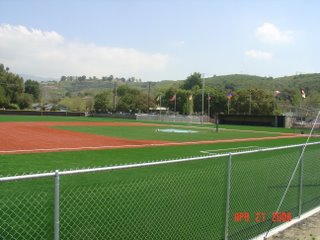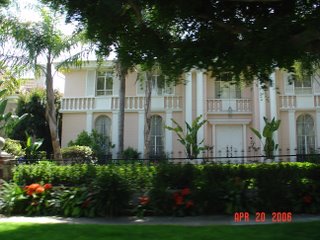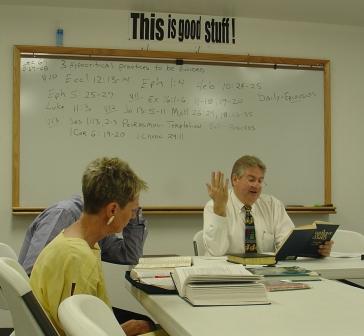Saturday, April 22, 2006
MY STUDENT
Friday, April 21, 2006
THE CAMPUS
Thursday, April 20, 2006
California Here We Come
Sunday, April 16, 2006
The Games People Play
Matt. 11:16-19 "But to what shall I compare this generation? It is like children sitting in the market places, who call out to the other children, 17. and say, `We played the flute for you, and you did not dance; we sang a dirge, and you did not mourn.' 18. "For John came neither eating nor drinking, and they say, `He has a demon!' 19. "The Son of Man came eating and drinking, and they say, `Behold, a gluttonous man and a drunkard, a friend of tax-gatherers and sinners!' Yet wisdom is vindicated by her deeds."
Luke 7:31-35 "To what then shall I compare the men of this generation, and what are they like? 32. "They are like children who sit in the market place and call to one another; and they say, `We played the flute for you, and you did not dance; we sang a dirge, and you did not weep.' 33. "For John the Baptist has come eating no bread and drinking no wine; and you say, `He has a demon!' 34. "The Son of Man has come eating and drinking; and you say, `Behold, a gluttonous man, and a drunkard, a friend of tax-gatherers and sinners!' 35. "Yet wisdom is vindicated by all her children."
Jesus continues to admonish this crowd that was ready to find fault with John’s questions to Jesus; Are you the Expected One, or do we look for someone else? (Matt. 11:3/Luke 7:19) Jesus looks to find the right words to exemplify a people who would find reason to criticize no matter what was done. This example is likened to our modern saying: “You would complain even if you were hung with a new rope.”
Jesus draws the words that a rabbi would say as he looked thoughtfully to craft an example for illustration. The words would roll out of the deep consideration of the rabbi as he said, “To what shall I compare?” The object of the comparison is this generation of people who were witnessing the miracles before their own eyes yet would not believe that Jesus was who He said He was.
The example is taken from the children who would play in the market places, who would call out to the other children to come play with them. The childhood games were reflections of what they saw the adults do when they would amass in groups. The kids were used to seeing weddings and funerals and would reenact these events in their games. Playing wedding would be a festive fun time of music and dance in the streets. The other end of the spectrum would be the funeral where a dirge was sung and the streets would be filled with mourning.
With the preceding background as illumination we see Jesus say that there is no pleasing you people. We played our imaginary flute for you and you did not dance so we changed the game to satisfy you. We sang a dirge and you did not mourn. Don’t you want to play something? Is there anything that can be done to bring satisfaction to you?
The admonishment is now turned up from childhood games to adult facts about John the Baptist and Jesus. We again find the same dissatisfaction with the adults. For John came neither eating nor drinking, and they say, “He has a demon!” This is the reaction that the religious people had toward John who had common people coming to him in his element and caused jealousy do to the loss of glory/attention toward the religious elite.
Luke 7:31-35 "To what then shall I compare the men of this generation, and what are they like? 32. "They are like children who sit in the market place and call to one another; and they say, `We played the flute for you, and you did not dance; we sang a dirge, and you did not weep.' 33. "For John the Baptist has come eating no bread and drinking no wine; and you say, `He has a demon!' 34. "The Son of Man has come eating and drinking; and you say, `Behold, a gluttonous man, and a drunkard, a friend of tax-gatherers and sinners!' 35. "Yet wisdom is vindicated by all her children."
Jesus continues to admonish this crowd that was ready to find fault with John’s questions to Jesus; Are you the Expected One, or do we look for someone else? (Matt. 11:3/Luke 7:19) Jesus looks to find the right words to exemplify a people who would find reason to criticize no matter what was done. This example is likened to our modern saying: “You would complain even if you were hung with a new rope.”
Jesus draws the words that a rabbi would say as he looked thoughtfully to craft an example for illustration. The words would roll out of the deep consideration of the rabbi as he said, “To what shall I compare?” The object of the comparison is this generation of people who were witnessing the miracles before their own eyes yet would not believe that Jesus was who He said He was.
The example is taken from the children who would play in the market places, who would call out to the other children to come play with them. The childhood games were reflections of what they saw the adults do when they would amass in groups. The kids were used to seeing weddings and funerals and would reenact these events in their games. Playing wedding would be a festive fun time of music and dance in the streets. The other end of the spectrum would be the funeral where a dirge was sung and the streets would be filled with mourning.
With the preceding background as illumination we see Jesus say that there is no pleasing you people. We played our imaginary flute for you and you did not dance so we changed the game to satisfy you. We sang a dirge and you did not mourn. Don’t you want to play something? Is there anything that can be done to bring satisfaction to you?
The admonishment is now turned up from childhood games to adult facts about John the Baptist and Jesus. We again find the same dissatisfaction with the adults. For John came neither eating nor drinking, and they say, “He has a demon!” This is the reaction that the religious people had toward John who had common people coming to him in his element and caused jealousy do to the loss of glory/attention toward the religious elite.









